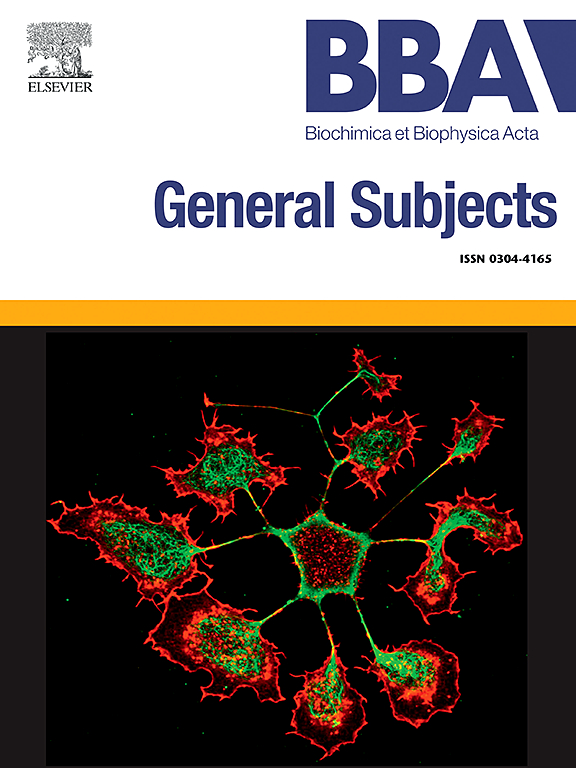G-quadruplex in cancer energy metabolism: A potential therapeutic target
IF 2.2
3区 生物学
Q3 BIOCHEMISTRY & MOLECULAR BIOLOGY
Biochimica et biophysica acta. General subjects
Pub Date : 2025-04-18
DOI:10.1016/j.bbagen.2025.130810
引用次数: 0
Abstract
In recent years, energy metabolism in cancer has received increasing attention as an important component of tumor biology, and the functions of transcription factors, mitochondria, reactive oxygen species (ROS) and the autophagy-lysosome system in which have been elucidated. G-quadruplex (G4) is a molecular switch that regulates gene transcription or translation. As an anticancer target, the effect of G4 on cancer cell proliferation, apoptosis, cycle and autophagy has been recognized. The energy metabolism system is a unified whole composed of transcription factors, metabolic regulators, metabolites and signaling pathways that run through the entire cancer process. However, the role of G4 in this complex metabolic network has not been systematically elucidated. In this review, we analyze the close correlation between G4 and transcription factors, mitochondria, ROS and the autophagy-lysosome system and suggest that G4 can exert a marked effect on cancer energy metabolism by regulating the above mentioned key regulatory elements. The anticancer effects of some G4 ligands through regulation of energy metabolism have also been summarized, confirming the clear involvement of G4 in energy metabolism. Although much more research is needed, we propose that G4 may play a critical role in the complex energy metabolism system of cancer, which is a promising target for anticancer strategies focusing on energy metabolism.
肿瘤能量代谢中的g -四重体:一个潜在的治疗靶点
近年来,肿瘤中的能量代谢作为肿瘤生物学的一个重要组成部分越来越受到人们的关注,转录因子、线粒体、活性氧(reactive oxygen species, ROS)和自噬-溶酶体系统在其中的功能已被阐明。g -四重体(G4)是调节基因转录或翻译的分子开关。作为一种抗癌靶点,G4对癌细胞增殖、凋亡、周期和自噬的影响已被公认。能量代谢系统是一个由转录因子、代谢调节因子、代谢物和信号通路组成的统一整体,贯穿于整个癌症过程。然而,G4在这个复杂的代谢网络中的作用尚未被系统地阐明。本文分析了G4与转录因子、线粒体、ROS和自噬溶酶体系统的密切关系,认为G4通过调控上述关键调控元件对肿瘤能量代谢有显著影响。本文也总结了一些G4配体通过调节能量代谢来抗癌的作用,证实了G4在能量代谢中的明确参与。虽然还需要更多的研究,但我们认为G4可能在癌症复杂的能量代谢系统中发挥关键作用,是关注能量代谢的抗癌策略的一个有希望的靶点。
本文章由计算机程序翻译,如有差异,请以英文原文为准。
求助全文
约1分钟内获得全文
求助全文
来源期刊

Biochimica et biophysica acta. General subjects
生物-生化与分子生物学
CiteScore
6.40
自引率
0.00%
发文量
139
审稿时长
30 days
期刊介绍:
BBA General Subjects accepts for submission either original, hypothesis-driven studies or reviews covering subjects in biochemistry and biophysics that are considered to have general interest for a wide audience. Manuscripts with interdisciplinary approaches are especially encouraged.
 求助内容:
求助内容: 应助结果提醒方式:
应助结果提醒方式:


